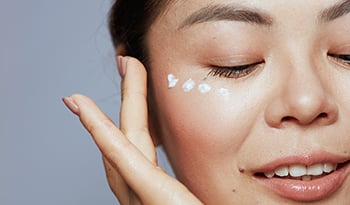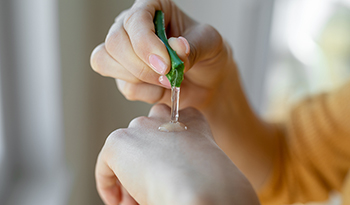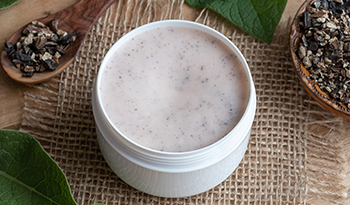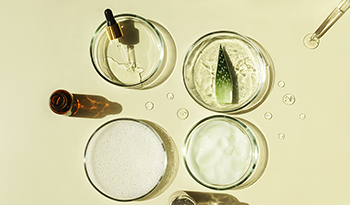How To Hydrate Skin Naturally From Within
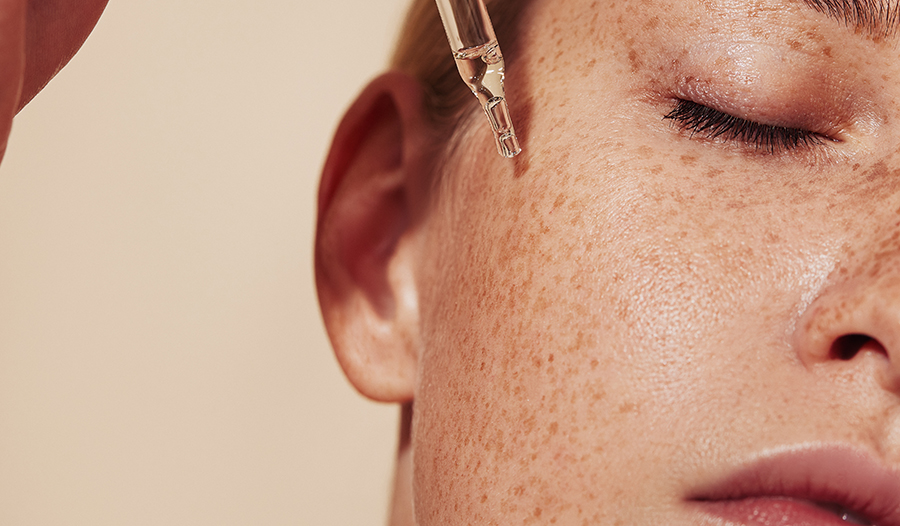
Key Takeaways
Here's how to increase skin hydration naturally:
- Eat whole, water-rich foods daily.
- Avoid excess caffeine and alcohol, which can dehydrate the body.
- Drink 8–10 glasses of fluid throughout the day.
- Supplement with hydration boosters if needed.
- Exercise to improve blood flow and nutrient delivery to the skin.
- Sleep well, as your skin repairs and rehydrates overnight.
- Prioritize fiber for digestive health and nutrient absorption.
- Limit processed foods, which often contain dehydrating preservatives and sodium.
Natural hydration is less about perfection and more about rhythm and consistency. The goal is to make choices that nourish your cells, not just your cravings.
Is Your Skin Dehydrated?
Dewy, radiant, glowing skin is not just a result of slathering on creams and serums; it starts from within. Skin hydration from within means nourishing your body with foods, drinks, nutrients, and habits that support optimal moisture levels, cell function, and elasticity.
In a world of climate-controlled environments, caffeine-fueled routines, and high-stress living, internal skin hydration is more important than ever. When your body is hydrated and nutritionally supported, your skin can perform its vital roles—like protecting against irritants, retaining moisture, and repairing damage—more effectively.
By focusing on internal hydration, you're not just boosting the outer glow. You're helping your skin stay strong, resilient, and truly healthy from the inside out.
Foods That Hydrate Skin From Within
What you eat plays a foundational role in skin hydration. The water content in fruits and vegetables acts as a direct moisture source, but it's the synergy between hydration and nutrients that truly transforms your skin.
High-Water Content Fruit
Consider cucumbers and watermelon: both are more than 90% water and contain silica and lycopene, which support skin elasticity and protection. Avocados bring healthy fats and vitamin E into the picture, nurturing the lipid layer that locks in moisture. Sweet potatoes, rich in beta-carotene, help fortify the skin's natural defense against dryness and environmental stressors.
Omega-3 Rich Foods
Omega-rich foods like walnuts, chia seeds, and flaxseeds go a step further by supporting the skin's barrier function. These fats help reduce transepidermal water loss, keeping skin supple and smooth. And don't underestimate leafy greens: kale, spinach, and arugula offer chlorophyll, magnesium, and vitamin C, a trifecta of hydration, detoxification, and collagen support.
Fermented Foods
Fermented foods, such as yogurt, kimchi, and sauerkraut, support gut health, an emerging factor in skin hydration. A healthy gut helps regulate inflammation and nutrient absorption, giving your skin access to the building blocks it needs to stay moist and radiant.
Incorporating a variety of these foods consistently—ideally with each meal—helps reinforce your skin's hydration layer day after day.
Drinks For Skin Hydration
Drinking water is essential, but it's not the only way to hydrate your skin internally. Choosing fluid-rich beverages that offer additional nutrients gives your hydration strategy a major upgrade.
Coconut Water
Coconut water isn't just trendy; it's naturally rich in potassium, magnesium, and electrolytes that help replenish cells and maintain optimal fluid distribution. Aloe vera juice supports hydration by soothing inflammation from the inside out and aiding digestion, which indirectly boosts skin clarity.
Green Tea
Green tea adds a layer of antioxidant protection. Its catechins help regulate oil production, soothe irritation, and prevent skin dehydration caused by oxidative stress. Herbal teas like chamomile, peppermint, or rooibos offer additional hydration while gently calming the nervous system, a crucial benefit, since stress is known to impair skin hydration.
For best results, sip fluids throughout the day instead of binge-drinking water once or twice daily. Think of hydration as a rhythm, not a one-off act. Try adding mineral drops or fruit infusions to water for extra benefit and variety.
Supplements To Boost Skin Hydration
Not everyone gets enough skin-supporting nutrients through food alone. Supplements can help fill the gap and encourage hydration deep in the dermal layers. If you're considering supplements, look for bioavailable forms, meaning the body absorbs and uses them efficiently, and always scan for unnecessary fillers or synthetic additives.
- Hyaluronic acid: Naturally found in the body, it holds water in skin cells for a plump, smooth look
- Omega-3 fatty acids: Help strengthen the skin barrier and reduce water loss
- Vitamin E: An antioxidant that works to prevent dryness and protect skin integrity
- Collagen supplements: Improve skin moisture retention and elasticity
- Zinc: Regulates skin oil production and helps with inflammation
- Ceramides: These lipids replenish your skin's natural protective layer
Supplements work best when used in combination with a nutrient-rich diet and consistent hydration habits. If your skin frequently feels tight or flaky despite good topical care, it's worth assessing internal hydration support.
Vitamins That Support Internal Skin Hydration
The link between vitamins and hydration runs deeper than surface glow. They help orchestrate the biological functions that allow your skin to retain moisture, fight free radicals, and rebuild tissue.
- Vitamin A: Supports skin cell turnover and strengthens structure
- Vitamin C: Essential for collagen production and retaining moisture
- Vitamin D: Plays a role in skin barrier function and immune resilience
- Vitamin E: Protects against oxidative damage and maintains hydration
- B Complex (especially B3 and B5): Promotes healing, barrier strength, and moisture retention
Deficiency in any of these can lead to dullness, flakiness, or slow skin repair, especially when stress, hormonal changes, or diet shifts are in play. Always choose trusted brands, ideally with third-party testing for purity and potency.
Lifestyle Tips To Improve Skin Hydration
Skin hydration from within is not just biological—it's behavioral. The way you live affects how your body retains water and uses nutrients for skin health.
Manage Stress
Stress management is critical. Chronic stress stimulates cortisol, which can weaken the skin barrier and lead to dehydration. Incorporating grounding habits, like mindful movement, breathwork, or even sound therapy, helps regulate stress and give your skin a better chance to heal and hold moisture.
Prioritize Sleep
Sleep plays a regenerative role. During deep sleep cycles, your skin goes into repair mode, replenishing lost hydration and reinforcing cellular renewal. Aim for 7–9 hours nightly in a dark, cool environment, ideally with added humidity if you're in a dry climate.
Move Often
Gentle movement increases circulation, which delivers nutrients and oxygen to skin cells. This doesn't have to mean intense workouts. A brisk walk, restorative yoga, or dancing can boost hydration indirectly by improving cellular function.
Evaluate Your Environment
Finally, consider how your environment affects hydration. Air-conditioning, high heat, wind, and pollution all strip moisture from the skin. Using a humidifier, avoiding harsh cleansers, and practicing gentle skincare rituals (paired with internal hydration techniques) can help offset these external stressors.
Hydration Pitfalls To Avoid
It's easy to think more water equals better hydration, but it's not always that simple. Internal skin hydration depends on a balance of water, electrolytes, fats, and nutrients, not just how much you drink.
- Avoid excessive alcohol and caffeine without offsetting with fluids.
- Be wary of topical-only hydration routines that ignore diet and stress.
- Don't skip meals or rely solely on smoothies; fiber and chewing support digestion and hydration.
- Overuse of diuretics (even herbal ones) can strip essential fluids.
- Watch out for trendy "detoxes" that omit fats and proteins; these are key for moisture retention.
Hydration needs can also change based on life stage and environment. Tuning into your body, rather than following rigid advice, leads to better results.
Hydration Across Ages and Seasons
Your hydration strategy evolves with you. Children and teens, for example, often metabolize water quickly and need more electrolytes during growth or activity. In adulthood, hydration may be impacted by hormones, stress, or lifestyle shifts, and older adults naturally retain less water, so they benefit from foods rich in water and easy-to-digest fats.
Seasons matter too. In summer, external heat draws moisture from the skin, so fruit and herbal teas with added electrolytes can help. Winter brings dry air, and fats, root vegetables, and warm broths become your hydration allies. Spring and fall are transitional; this is the time to focus on circulation, gut health, and routine.
Benefits Of Internal Skin Hydration
Hydrated skin from within doesn't just look good, it functions better.
- Improved elasticity and reduced fine lines
- Smooth, even texture with fewer dry patches
- Reduced inflammation and sensitivity
- Brighter complexion and natural glow
- Resilient skin that heals faster and holds moisture longer
- Enhanced performance of topical skincare products
These benefits are cumulative.
The Big Picture
Hydrated skin isn't just the result of good products; it's the reflection of thoughtful nourishment, daily rituals, and a lifestyle that values inner wellness. By prioritizing internal skin hydration through foods, fluids, supplements, and habits that support your body's natural rhythms, you empower your skin to thrive in any environment and at any age.
References:
- Park K. Role of hyaluronic acid in skin barrier function and hydration. J Dermatol Sci. 2011;63(2):71–73.
- Amann P, Rassner G, Schmid-Ott G. Omega-3 fatty acids and the skin: An overview. Skin Pharmacol Physiol. 2017;30(5):199–210.
- Lin JY, et al. Protective effects of vitamin C against skin aging. Dermatoendocrinol. 2012;4(3):253–258.
- Dreno B, et al. Zinc salts for the treatment of inflammatory acne. Int J Dermatol. 2013;52(5):606–610.
- Proksch E, et al. Oral supplementation of collagen peptides improves skin hydration. Skin Pharmacol Physiol. 2014;27(3):113–119.
- Rosenbaum S, et al. Gut–skin axis: How the microbiome influences dermatological health. Int J Mol Sci. 2021;22(15):8405.
- Cho S, et al. Seasonal variation in skin hydration and barrier function. Int J Cosmet Sci. 2015;37(4):435–443.
- Sethi A, et al. Vitamin D and the skin: A review. J Dermatol Treat. 2013;24(1):12–19.
DISCLAIMER:This Wellness Hub does not intend to provide diagnosis...
















































































 Table of Contents
Table of Contents




